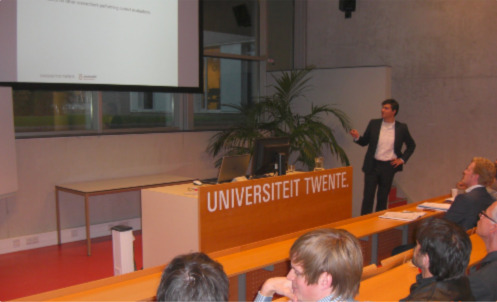Scaling Learning to Rank to Big Data: Using MapReduce to Parallelise Learning to Rank
by Niek Tax
Learning to rank is an increasingly important task within the scientific fields of machine learning and information retrieval, that comprises the use of machine learning for the ranking task. New learning to rank methods are generally evaluated in terms of ranking accuracy on benchmark test collections. However, comparison of learning to rank methods based on evaluation results is hindered by non-existence of a standard set of evaluation benchmark collections. Furthermore, little research is done in the field of scalability of the training procedure of Learning to Rank methods, to prepare us for input data sets that are getting larger and larger. This thesis concerns both the comparison of Learning to Rank methods using a sparse set of evaluation results on benchmark data sets, as well as the speed-up that can be achieved by parallelising Learning to Rank methods using MapReduce.
In the first part of this thesis we propose a way to compare learning to rank methods based on a sparse set of evaluation results on a set of benchmark datasets. Our comparison methodology consists of two components: 1) Normalized Winning Number, which gives insight in the ranking accuracy of the learning to rank method, and 2) Ideal Winning Number, which gives insight in the degree of certainty concerning its ranking accuracy. Evaluation results of 87 learning to rank methods on 20 well-known benchmark datasets are collected through a structured literature search. ListNet, SmoothRank, FenchelRank, FSMRank, LRUF and LARF were found to be the best performing learning to rank methods in increasing order of Normalized Winning Number and decreasing order of Ideal Winning Number. Of these ranking algorithms, FenchelRank and FSMRank are pairwise ranking algorithms and the others are listwise ranking algorithms.
In the second part of this thesis we analyse the speed-up of the ListNet training algorithm when implemented in the MapReduce computing model. We found that running ListNet on MapReduce comes with a job scheduling overhead in the range of 150-200 seconds per training iteration. This makes MapReduce very inefficient to process small data sets with ListNet, compared to a single-machine implementation of the algorithm. The MapReduce implementation of ListNet was found to be able to offer improvements in processing time for data sets that are larger than the physical memory of the single machine otherwise available for computation. In addition we showed that ListNet tends to converge faster when a normalisation preprocessing procedure is applied to the input data. The training time of our cluster version of ListNet was found to grow linearly in terms of data size increase. This shows that the cluster implementation of ListNet can be used to scale the ListNet training procedure to arbitrarily large data sets, given that enough data nodes are available for computation.

